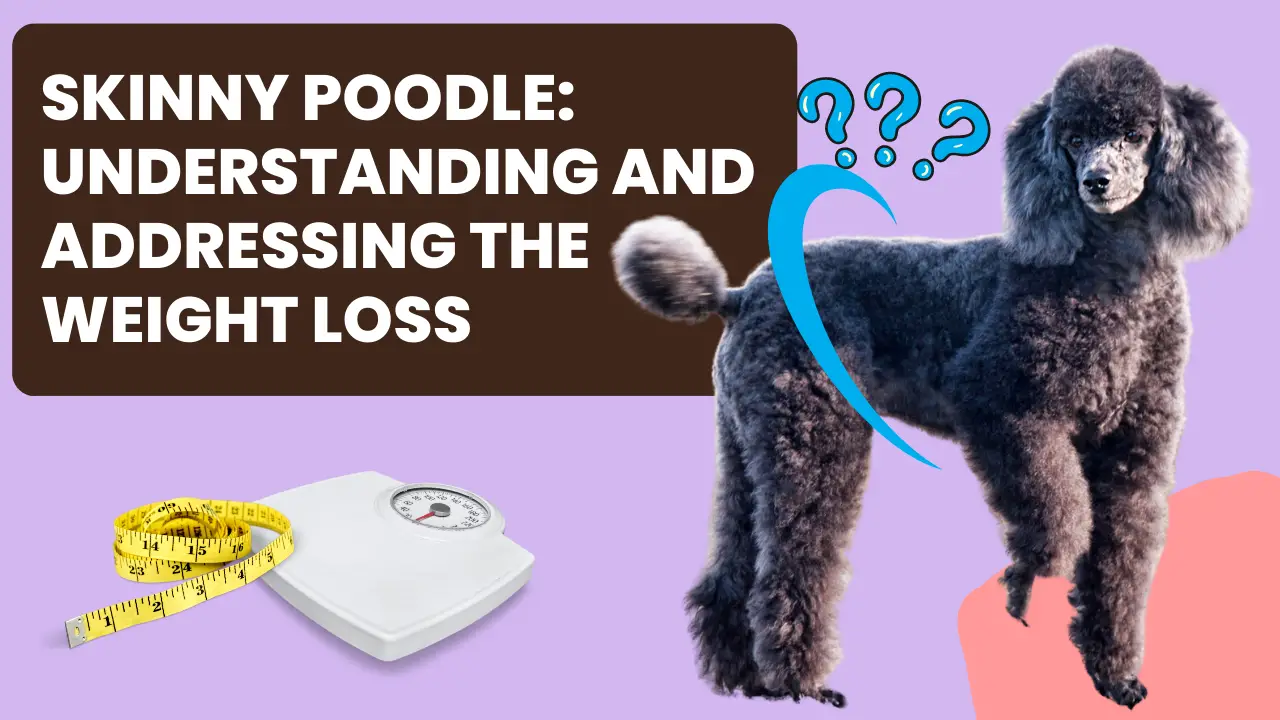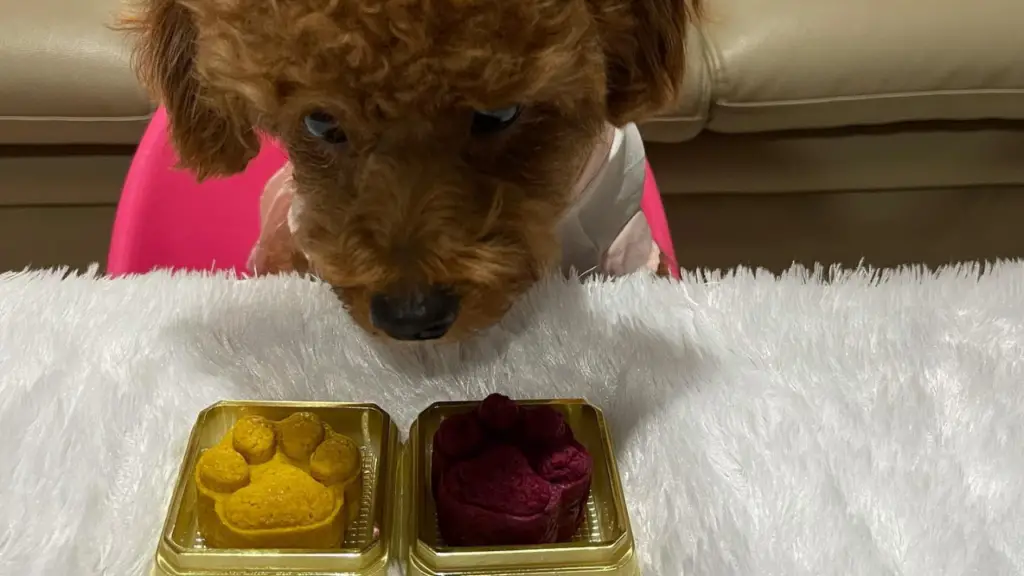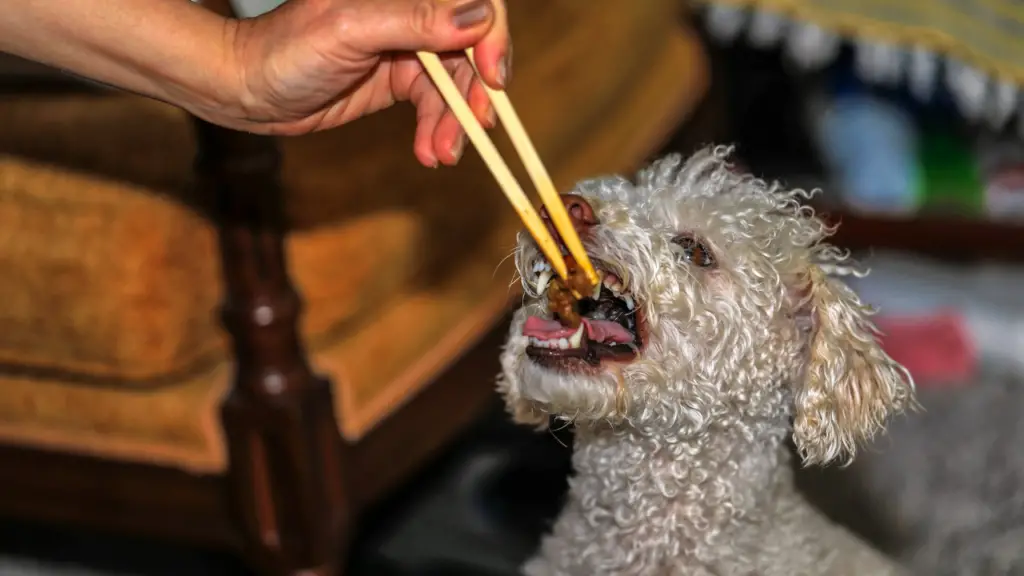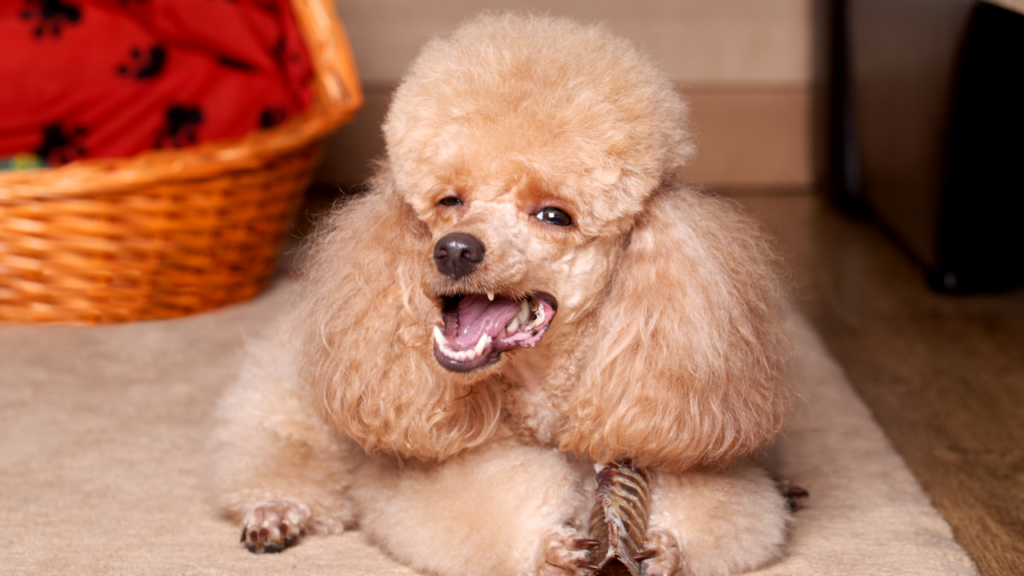As a poodle owner or someone considering getting a poodle, it is essential to know the optimal weight range. A Poodle’s weight can vary depending on their breed, and keeping them at their optimal weight can help prolong their life and keep them healthy.

To assess your Poodle’s weight, it’s essential to utilize a body conditioning score tool that uses a scale of 1-9, with 1 being extremely underweight and 9 meaning obese.
In this article, we will explore how to determine if your Poodle is underweight or overweight, the importance of maintaining a healthy weight, and what you can do to help your Poodle achieve their ideal weight range.

Read our Smart Poodles - Smart Tricks eBook for only $2.99
Dive into a treasure trove of engaging tricks and tips designed specifically for your poodle!
How much should your Poodle weigh?
A Poodle’s weight can vary based on whether they’re Standard, Miniature, or Toy. On average, the typical weight guidelines for each breed are the following:
| Age | Toy | Miniature | Standard |
| 8 weeks | 1lb/0.45kg | 3-4lbs/1-2kg | 5-10lbs/2-5kg |
| 6 months | 3lb/1.4kg | 7-8lbs/3-4kg | 20-40lbs/9-19kg |
| 1 year | 4-6lbs/1.8-2.8kg | 10-15lbs/4-7kg | 40-70lbs/18-32kg |
When looking at the above figures, it’s also essential to consider their genders. According to the American Kennel Club, their height and weight can also vary.
Why concentrate on their weight?
If you plan on owning a Poodle or already have one, their weight should always be a concern. I say this because dogs function just like us humans. If we are too skinny or fat, many health problems may occur, precisely the same for Poodles. Keeping your pet at their optimal weight will help prolong their life and keep them with you as a family member for as long as possible.
Utilize the body condition score tool
While putting your Poodle on the scales can indicate their weight, it’s not a good overall judgment of their health. The best way to view the amount of fat they have on their body is by using a body conditioning score. It’s actually a lot more cost-effective, so you don’t need scales to do it! Body conditioning scoring is simple and becomes easier the more you do it.
It involves a scale of 1-9, 1 being extremely underweight and 9 meaning obese. On average, for your Poodle to be healthy, you’ll want them to score between 4-5 on the scale.
Looking at your Poodle to see if it’s skinny
When checking to see if your Poodle is underweight, it’s always essential to consider that their weight range can vary. However, generally, these are a few indicators that they’re underweight which are:
- You can easily feel or see their spine coming out of their body.
- Little fat covers their ribs, and you can easily feel/see them.
- Little muscle covering their hips and shoulders.
- Their waist bones are visible.
- Their tummy is very tucked in.
Seeing if your Poodle is overweight
On the contrary, it’s equally important to check if your Poodle is overweight. Some common indicators that they need to lose weight are:
- A thick waist that does not narrow towards the rib cage.
- Unable to feel their ribs when applying gentle pressure.
- Visible belly fat
- Appearing ‘stocky’
Seeing a veterinarian
While body condition scoring and feeling their body for weight gain or loss can be helpful, you cannot ignore the help of a professional. Weight is such an important topic to help extend your Poodle’s life and keep them healthy that you should always seek advice from a veterinarian.

Veterinarians will not only check their weight but also look at their diet according to their age. They’ll also weigh your dog at appointments or checkups, recording the weight of your Poodle and comparing them to past figures. Based on their weight, your vet will be able to recommend the right diet and calorie intake for your Poodle.
Medical reasons for being too skinny
If you feel your Poodle is too skinny, it may result from an underlying medical condition, digestive problems, or a bad diet. Before visiting a vet, you’ll want to review the following:
Diet
Before ruling out any options for weight loss, you’ll want to look at your Poodle’s diet first. The primary factor about dog food is not every dog likes the same food! However, regardless of the breed you own, you should be feeding your Poodle high quality dog food with premium ingredients.
If you’re feeding your Poodle cheaper food, it’s likely to have filler ingredients packed with preservatives and additives. These can be detrimental for your Poodle, making them ill and prone to sickness.

Your Poodle’s stomach may react to common allergens in food like pork, chicken, beef, and lamb. If this is the case, you might want to change the food and choose a food that accommodates a sensitive stomach, like turkey, salmon, or duck. Choosing the right food can be a process of elimination. In some instances, a vet may recommend a prescription hydrolysed diet.
Picky eating
Another reason your Poodle might be losing too much weight is because they’re a picky eater. There might be nothing wrong with the food your Poodle is eating, but if they’re bored, they might stop. To know if they’re being fussy, look at when they start eating. If there is a genuine problem with the food, they will refuse it from the first day you feed it to them.
On the other hand, if you feel your Poodle is being too picky, then you might want to try the following:
- Limit treats: One good way to stop their picky eating is by seriously cutting down their daytime treats. With Poodles being one of the most intelligent breeds on the planet, they may know when to behave just to get a good treat. Often, they may find treats tastier than kibble themselves. Therefore reduce the number of treats, dental sticks and chews you feed your Poodle in between needles.
- Switch up the food: As I mentioned above, your Poodle may have become bored with the food. So try transitioning to a new food to help regain their interest in eating at each meal.
- Stick to meal times: Whenever possible, limit their interaction with food by removing their bowls after a meal. Doing this will signify to their Poodle they can’t graze to pick throughout the day. While it might not feel nice if your dog is hungry, if they are otherwise well, they can manage 1-2 days without eating for their appetite to kickstart.
- Warm up their food: One thing you can try is trying to warm up their food slightly before serving. You can also heat a dinner plate and put it on there, so your Poodle thinks they’re getting human food. Warm food is tastier and the aroma is released more easily, making it more pleasant for your dog to eat.
Over Exercising
Another reason you may find your Poodle losing a lot of weight would be because they are over-exercising. On average, the AKC recommends they should have around 60 minutes of active exercise a day. However, if you’re slightly overdoing the one hour mark and they’re not getting enough calories in their body, this could be a major reason why they are dropping the pounds.
Underlying medical condition
Another possibility you cannot rule out for your Poodle’s weight loss is due to underlying medical conditions such as:
- Food allergies: Which can lead to calorie loss due to excessive vomiting and loose stools
- Diabetes: Meaning the body cannot absorb and process the sugars from food properly.
- Pain: Their appetite might be impacted, making it difficult for them to feel like eating.
- Anxiety: Struggling to concentrate on their food and eating or a general lack of appetite due to high cortisol.
If you feel your Poodle could be suffering from an underlying medical condition, you must speak to a vet who can run tests to see if they have any problems.
Dietary Considerations for Skinny Poodles
To keep your Poodle healthy, you must stick to a balanced diet filled with nutrients. The right diet will help their growth, development, and general health. Plus, Poodles are prone to inheriting health issues like skin allergies, hip dysplasia, and eye problems. Therefore you’ll want to give them food high in omega-3 fatty acids that can reduce inflammation and keep their coat shiny.
Nutrients you must consider
When feeding your Poodle, you must ensure that their diet contains five essential nutrients: proteins, carbohydrates, fats, minerals and vitamins. Their body needs these so it can perform the most basic functions.
- Proteins: Your Poodle needs protein from chicken, beef, lamb, pork, or certain legumes. They contain essential amino acids that help them gain muscles, repair tissues, and have healthy skin and hair.
- Fats: Poodles require fatty acids like omega 3 and 6, and linoleic acid. These come from food and help your Poodle with its skin and coat.
- Carbohydrates: Your Poodle will need carbohydrates from cereal grains like oats, whole wheat, millet, potato, brown rice, and more. These contain starch, sugar, and fiber, which helps give them energy and keeps their intestines healthy.
- Vitamins and minerals: All food should have vitamins A, D, E, K, B-complex, calcium, iodine and phosphorus. This will help your Poodle build bones and stay strong.
If you’re unsure about the right food or ratio of food to feed your Poodle, it’s best to speak to a vet who can suggest the right diet based on their health and needs.
Keep in mind portion control and feeding frequency
Another thing you must keep in mind for your Poodle’s health and well-being: is their portion control and feeding frequency. First of all, they must receive an adequate amount of food based on their age, size, and activity level.
Don’t always stick to the recommendations on the packaging of dog food! Every dog is an individual with a unique metabolism. Always factor in your Poodle’s breed, age, and daily routine before deciding their portions. To have a better idea of how much to feed them, speak to your vet.

Moreover, you must be careful how often you feed your Poodle. Like some big breeds, Standard Poodles are at risk of a life threatening condition known as bloat, when their stomach fills up with air and twists. Therefore you’ll want to feed them small and regular meals during the day and be consistent with the timings to help with their digestion.
What we recommend
If you want your Poodle to gain some more weight, there are a few options you might want to try, such as:
Mixing wet and dry kibble
Mixing up their kibble is one effective way to get your Poodle to eat more food. Try to stick to a split of 20% wet kibble and 80% dry. You should add wet food because it’s incredibly high in protein, tastier, and makes it more appealing to eat.
One good brand you might want to try for your Poodle is Purina. This brand has a gravy-based food with real beef and salmon with no artificial ingredients or preservatives. Because it’s canned, it takes longer to expire and is quick to add in with dry kibble.
Feed unsalted chicken broth
Another good way to help your Poodle regain their appetite is by feeding them unsalted chicken broth. You’ll want to feed your Poodle this between their meal times, use a natural chicken broth, and avoid stock cubes. Stock cubes are full of additives and preservatives.
Kibble and fresh food
Another quick and simple option is making some homemade dog food*. It takes around 15 minutes on average.
Ingredients
- Ground kibble x ½ cup
- Cream cheese x 8 ounces
- Creamy unsalted peanut butter x ½ a cup
- Beef(browned ground) x ½ a pound
Instructions
- Get a bowl, add the ground beef, peanut butter, kibble, and cream cheese
- Mix them well and knead them to make dough. If you wish, you can add more kibble to keep the dough dry,
- Roll the dough and then slice for serving.
While it is fine to feed the odd home made meal, if planning to do this long term you must consult with a canine nutritionist to ensure the meals fed are balanced.
Supplements for meals
One option you might want to consider is using supplements that are high in calories. For instance, you can get dog-friendly peanut butter that contains no salt, palm oil or xylitol to help kickstart their appetite.
Note: Peanut butter is slightly high in fat and contains a lot of calories, so be careful how much you feed your Poodle. Try to add only one tablespoon a day or half at each meal to help kickstart their appetite.
Marko is the founder and author at PoodleHQ, where he blends profound expertise with formal training in Animal Behavior and Canine Genetics. With multiple generations of poodles under his care, he’s a breed connoisseur, honored with the Canine Care Excellence Award and lauded by the International Pet Enthusiasts Association.

